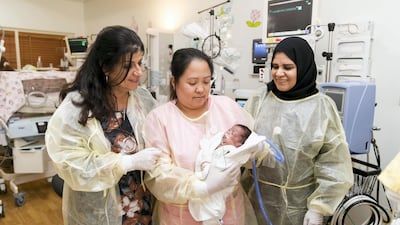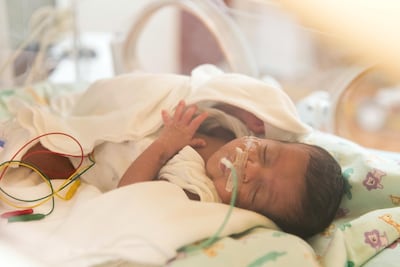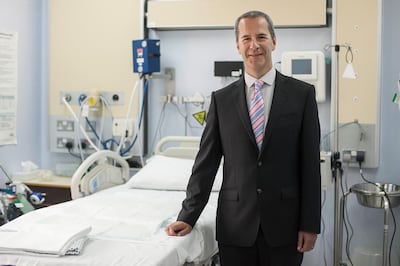Abu Dhabi’s largest maternity unit has opened to expats again after it had to turn away non-Emiratis away due to sheer demand.
Corniche Hospital changed its insurance policy in 2014 to only accept UAE nationals carrying the Thiqa insurance card or expats in emergencies.
At the time its staff were delivering 12,000 babies per year - by comparison the largest hospital in the UK delivers about 8,000.
Since then several specialist maternity hospitals have opened in the city and eased the demand on its services.
Corniche is currently delivering about 6,000 babies per year, and uses its advanced neonatal facilities to treat complex cases.
"We were out of space. We were taking so many patients that we had to decided how we wanted to manage this,” said Paul Bosio, the chief medical officer.
“Even when we restricted our services to UAE nationals, we remained open to accepting the most complicated pregnancy cases of non-UAE nationals."
He said many of the services that the hospital offers are not available in the private sector - particularly those concerning neonatal care and surgery.
_______________
Read more:
Abu Dhabi’s Corniche Hospital to limit maternity patient numbers
Couple lose one baby boy but are thankful the other survives twin syndrome
_______________
In the past four years Corniche has expanded not only its services but rooms as well, though it remains in the well-known site it has occupied since 1984. The hospital first opened in 1977 in a former hotel.
Previously patients had to share rooms with as many as three mothers sharing one room on occasion.
“We had to change that,” Dr Bosio said.
The hospital has 183 rooms, forty-two of the rooms are single occupancy, reserved for Emirati patients, and the remainder are two-bed.
Sheri Watkins, chief nursing officer, said the goal is to have one room per patient.
“We will try to limit the occupancy to one patient but it is important to know that because of the way pregnancy works, we can have a number of patients scheduled to deliver at a certain time but that may not happen. There are times when our census drop and there are times when our census are high and when it does surge, we might have to put a second patient in the same room."
Corniche Hospital remains the main referral hospital for the private sector and boasts the largest and most advanced neonatal unit in the country.
Recently it also announced additional medical services such as IVF, which is available to all nationalities.
“There are now many other health providers in the market and because of that, we can now expand our services and offer them to everyone,” Dr Bosio said.
“The private sector will continue to refer their complicated cases to us because they can’t manage them, but instead of us waiting for referrals we are also now telling patients to come,” he said.
The hospital will accept the full range of insurance plans, including Daman Basic in the event of complicated pregnancies.
“We never turn away anyone and that has always been our mandate,” Dr Bosio said
The hospital will also for the first time guarantee that the patient will be followed up by the same doctor throughout the mother's pregnancy. Previously a patient would be seen by different doctors.
The hospital has also expanded their parking spaces which residents had previously complained about.



